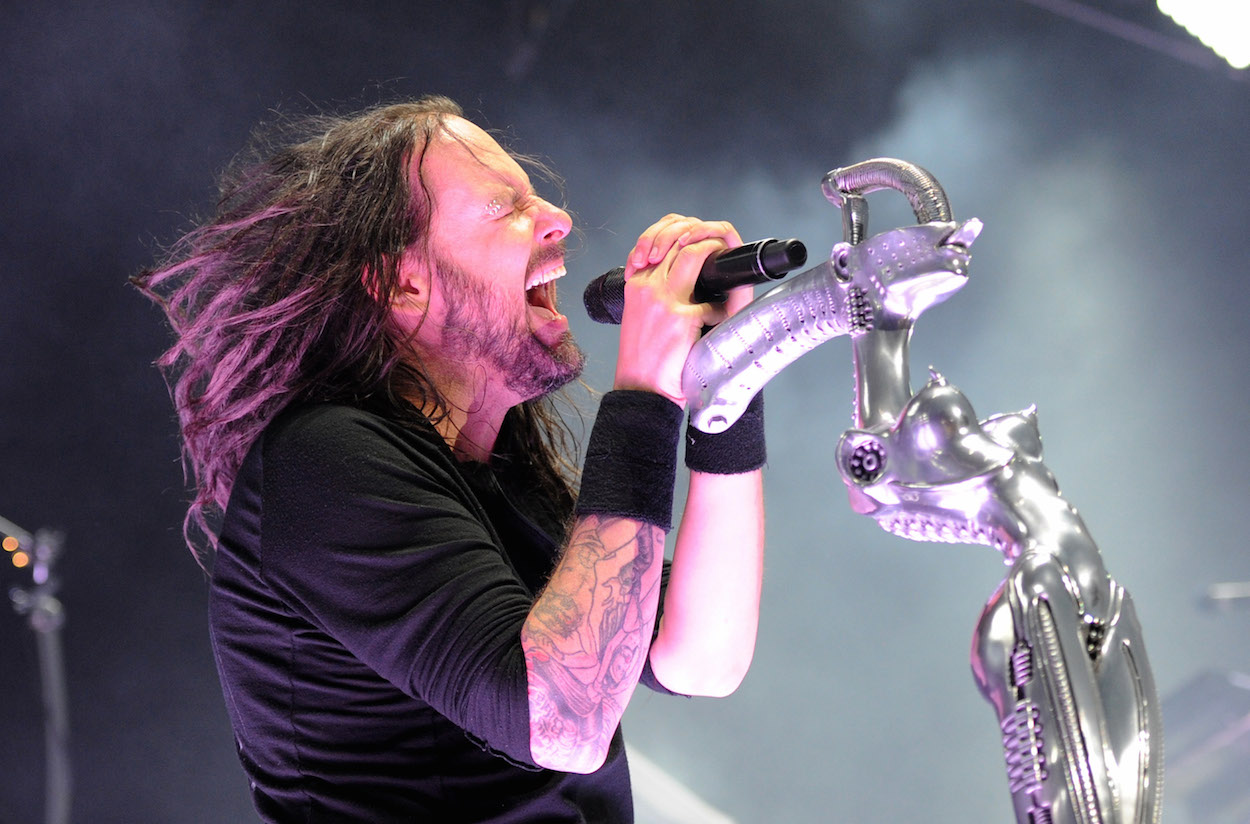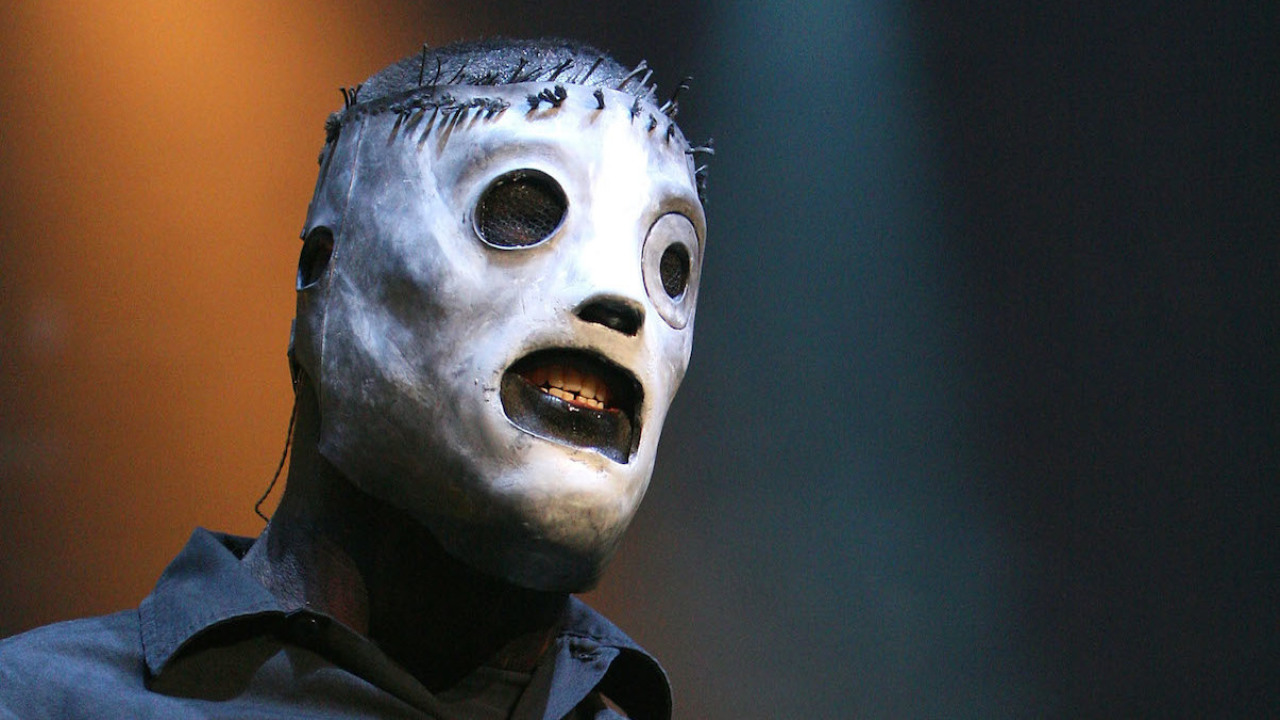COREY TAYLOR (SLIPKNOT)
As a kid, Slipknot and Stone Sour’s frontman Corey Taylor was hard to handle. He says his was “a life of displacement” and that he moved around a lot. He wouldn’t meet his father until he was an adult and lived variously with his uncle in Orlando, with his mother in Iowa and then with his grandmother.
“We moved so much that for a long time I didn’t know where I was from,” he said. “Around fourth grade my mom hooked up with this guy and we ended up moving to Florida out of nowhere. We went through some crazy shit down there, we ended up homeless on the beach in Fort Lauderdale for a while. I lost everything I had – all my clothes, all my toys and everything.”
By 15, Taylor was addicted to cocaine and had overdosed twice. He was living in Waterloo, Iowa with his mother – a place where he says, “I learned that life truly fucking sucks.” It wasn’t long before he had to get out.
Where he went was to his grandmother’s trailer. She was someone he respected, but who had no time for his misbehaviour. “Me and my grandma went through a lot of shit together,” he said. “She’s old school, she was like, ‘If you don’t like it, get the fuck out.’” And so, occasionally, he did. He lived on the street in Des Moines when his grandmother couldn’t handle him, bouncing from low to low. “I was even more fucked up then than I was on drugs. I didn’t know who I was or what I wanted to do,” he said.
But then he got into music. His grandmother bought him some gear and, soon, he realised that he could sing. He bumped into a musician called Shawn Economaki, then playing bass in a local band, and he mentioned that he needed a singer and a drummer.
“I could do both,” said Taylor. “I came over to one of their practices and they played me this music for a song called Little Girl – about ’90, ’91. They asked what I could do. I wrote the chorus and the rest of the song and they were just blown away. They were like, ‘Ok you’re our singer.’ I’d never been a singer in a band before.”
Soon, as the frontman in Stone Sour, he had a reputation as the best singer in Des Moines. It wasn’t long before Slipknot approached him. His experiences, though, would form the basis of the furious music he would go on to make, his addictions still haunting him through later life.

CHESTER BENNINGTON (LINKIN PARK)
Growing up in Phoenix, Linkin Parks’ Chester Bennington did not have the easiest childhood. “That’s a good way of putting it. I don’t want to sound like I had the worst life in the world but it wasn’t a whole lot of fun,” he said. “Growing up, for me, was very scary and very lonely. I started getting molested when I was about seven or eight.”
It was by a friend, someone a few years older than him. He says: “it escalated from a touchy, curious, ‘what does this thing do’ into full-on, crazy violations. I was getting beaten up and being forced to do things I didn’t want to do. It destroyed my self-confidence. Like most people, I was too afraid to say anything. I didn’t want people to think I was gay or that I was lying. It was a horrible experience.”
His parents divorced when he was 11 and he lived with his dad. “I felt abandoned by my mom,” he said. “My dad was not emotionally very stable then, and there was no-one I could turn to – at least that’s how my young mind felt.”
He would draw and write a lot, scribbling poetry. And he would also do drugs. A lot of drugs: opium, amphetamines, alcohol, marijuana and cocaine – “I’ve done everything. I got really, really bad,” he said.
On a normal day, says he was smoking “bong-hits of meth” before smoking opium to come down. “Or I’d drink so much that I’d shit my pants,” he added. “It was not pretty.” Then, in 1992, he was sitting in a friend’s house – and eight-and-half stone waif made up of string and bone – and suddenly the door burst open. He says a gang he knew as the Mexican Mafia burst in and began to pistol whip his friends. They swept the place for money, and stoke Bennington’s bike from outside. Terrified, he decided then and there that: “This isn’t cool. I’ve got to change my ways, I’ve got to stop the drugs. I’ve got to change my life.”
It wasn’t quite that easy, but it was a turning point. Soon, he headed to LA to audition for a band called Linkin Park. The drink and drug issues, though, would follow him into much later life. But he beat them in the end. Bennington, in some ways, doesn’t want to change what he went through: “After everything I’ve been through to get here,” he said after finally getting sober, “I’m in the best place I could possibly be.”

ROBB FLYNN (MACHINE HEAD)
The lyrics to Machine Head’s Five are one of the very few times in which the band’s singer Robb Flynn has discussed what he went through as a child. He finds the song so difficult to hear, and so hard to perform, that he says the band will never play it live and will never listen to it again. It’s not hard to see why. The words to the song make it painfully clear what happened when he was a boy: “You molest and destroy just a five year old boy. And you make me suffer motherfucker. Ripped my heart out. Innocence was lost.”
Flynn refuses to go into it. “It’s not something I want to talk about. It was a song ripped straight from the heart,” he said. “I don’t ever choose to think about it. But it creeps in though, it creeps in. When I’m alone in my bunk, lots of things that I don’t want to think about come into my head.”
It was a song written for the band’s much maligned 1999 album The Burning Red. The record was criticised for what people assumed was an attempt to ape nu-metal, but it was actually born from intolerable pain on Flynn’s part. He was then suffering from bulimia, and was in therapy as a means to cope with it. But the therapy was dredging up memories of his childhood and, to block them out, he was abusing alcohol and drugs like cocaine and ketamine to such an extent that, one night, he carved the word METAL in capital letters into his own chest with a bloody knife. The incident that he deals with in Five was one memory in particular that the therapy brought up and which he had to address.
But, after doing so, Flynn was furious that a record which contained a song of such raw emotion as Five was so widely derided by critics who disliked the rapping on From This Day and Desire To Fire. Even now, Flynn is angry that people missed the point of what he was doing and brushed over the most personal lyrics he had ever written.
“There’s a minute and a half of rapping on that album,” he said. “The other 53 minutes of the record are like a giant scar being ripped open while I projectile vomit through it. If all that people got out of that album was rap-metal, then they didn’t fucking listen to it.”

JAMES HETFIELD (METALLICA)
On The God That Failed, Metallica’s James Hetfield dealt with one of the overriding issues of his childhood. The song details the singer’s anger at those who put their faith in God above all else, and was based on his experiences growing up. Born to a truck-driver father and light opera singer mother, he was raised in a strictly Christian Scientist household. His mother, though, contracted cancer and died when he was 16 after refusing to accept any medical treatment because it went against her religion. She believed God would heal her; Hetfield was sure that doctors had a better chance.
Being raised in a Christian Scientist household had always made life hard for Hetfield – it marked him out at school where he was forced to sit out activities like health education, or even playing sports as it required him to have a physical from a doctor. “It really fucked with me as far as being different from other kids,” he admitted. He had become increasingly isolated as a result, and when his father divorced his mother four years before her death and he was forced to become the man of the house, he was furious at what he saw as his father’s selfishness. The lingering resentment of those years, and of his mother’s death, have stayed with Hetfield for much of his career – songs (the powerful Dyer’s Eve and Load’s Thorn Within among them) increasingly popping up that were inspired by the feelings that were forged then.

JONATHAN DAVIS (KORN)
When Korn singer Jonathan Davis’s parents split when he was three, he found himself being bounced around from home to home, forever being looked after by parents, friends, family members and step-parents. Few of them seemed to understand him. When, as a teenager, he became immersed in the new romantic and goth music of the ‘80s, they understood him even less – particularly when he began to wear eye make-up in honour of his heroes.
Unsurprisingly, it didn’t get any better at school. There he was branded a “faggot” for his eyeliner and interest in music and drama (the taunt resurfacing as the song Faget on Korn’s debut album). He became a loner, shunned by peers and family alike and when he was turfed out of home, aged 18, his morbid interests took him to the San Francisco College of Mortuary Science whereupon he embarked on a career of cutting up dead bodies – he boasted he could cut someone from “tongue to asshole” inside three minutes, and was amazed he “could do things that serial killers do and get paid for it”.
But perhaps that was just bravado, because Davis found the job profoundly disturbing – especially when babies or children were brought in. “Try cutting up a baby,” he said. “I did about 500 of them. You make a joke out of it, just to comprehend it. It’s the only way you stay sane.”
It was little surprise that, when he later joined Korn, he brought with him a wave of intensity. “They had a happier groove before I joined,” he said. “I brought out the darker elements”. One listen to the band’s self-titled debut is enough to hear just how dark the teenage inspiration that forged Davis’s lyrics writing really were.

CHAD KROEGER (NICKELBACK)
Once the spaniel-haired butt of almost every musical joke going, Nickelback’s Chad Kroeger may not be quite the spoiled (multi-platinum, admittedly) douchebag he appears.
“I don’t know how many times I got kicked out of school,” he told Playboy. “I just thought it was fun to be bad. To a certain degree I still think it’s fun to be bad. You should just never do anything that’s going to hurt someone else.”
His father – a rough, tough brawler who became a rodeo rider – walked out on the family when Kroeger was two and he was raised by his mother in a remote oil town in Alberta, Canada. When he wasn’t playing guitar, he was hiding from the police. He was constantly in trouble with the law, and was frequently caught stealing trucks and cars.
“I broke into my junior high school about 11 times and found the combination to this huge walk-in safe. God, it was like my personal ATM. I was probably 13. I bought a guitar with the money I stole. We’d take $500 or $600 at a time, and nobody noticed. Over a span of six or eight months I took thousands out of that thing.”
They noticed in the end, though. He was caught and ended up in juvenile prison – “I didn’t like the experience, incarceration’s no fun.” But it didn’t stop him. “I did a lot of stupid stuff. I remember being drunk and driving someone’s van without a license, then smashing it up. Then, while awaiting sentencing, I got picked up for shoplifting in Calgary. I was trying to go to a Metallica concert. I had to be released into my mom’s custody, and she still took me to the concert,” he remembered.
Those years crop up repeatedly in Nickelback’s music – Too Bad is about absent fathers, Where Do I Hide is about prison, Should’ve Listened is about his dad. Suddenly all the criticism directed the band’s way – that they’re frauds – seems a little tougher to stand up.

